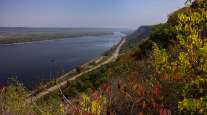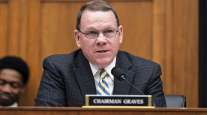Senior Reporter
Rouzer Outlines WRDA's Path to Passage

[Stay on top of transportation news: Get TTNews in your inbox.]
This spring, House Republicans will seek committee approval of a comprehensive water infrastructure bill significant to supply chain connectivity.
Sponsors of this Water Resources Development Act of 2024, the latest version of a biennial law, promise to pursue bipartisanship amid a tense political climate on Capitol Hill.
Rep. David Rouzer (R-N.C.), chairman of the Water Resources and Environment Subcommittee, is WRDA’s lead sponsor. During a recent wide-ranging interview with Transport Topics, he outlined a road map for clearing WRDA for the White House later this year.
To guarantee WRDA’s enactment, Rouzer’s subcommittee intends to have ready for the Transportation and Infrastructure Committee a draft this spring worthy of bipartisan consideration. The panel’s official markup consideration would likely occur sometime next month. If WRDA is advanced to the House floor, its consideration before the chamber could take place either in late April or May.
For Rouzer, a bipartisan bill will be necessary to garner requisite support in the Democrat-controlled Senate. Approval of a bipartisan product in the upper chamber would then prepare WRDA for enactment by the president.
“I’m very optimistic about that — I anticipate that we’ll have a good bipartisan product. I anticipate that we’ll have no issues marking up in the [House] subcommittee because of the work that’s going to be done ahead of time,” Rouzer told TT on Feb. 6, suggesting WRDA’s floor vote could be expedited procedurally.
Once the bill reaches the Senate, Rouzer acknowledged its consideration will be out of his control. “Obviously the Senate works on its own timetable and, you know, we’re two separate but equal bodies here in the legislative branch and so we’ll see where we are. But I don’t think WRDA is going to be holding anything up. There may be other bills that hold WRDA up a little bit just given the nature of the beast here sometimes. But at the end of the day, I fully expect we’ll have this signed into law by year end.”
Shane Kinne, @ProtectMORiver Executive Director, testified before House Transportation & Infrastructure last month, emphasizing the importance of passing a #WRDA bill, navigation resiliency, federal investment, & more @transportgop @transportdems https://t.co/UPw3HknAGX — The American Waterways Operators (@AWOAdvocacy) January 10, 2024
Last month, the House transportation panel reviewed WRDA proposals from members of the chamber. House lawmakers’ policy requests at this “Members’ Day” hearing ranged from port expansion projects to environmental surveys for dams and waterways. A typical WRDA consists of provisions related to flood mitigation, funding for ports, dams, waterways, canals and locks. Projects under the Army Corps of Engineers’ jurisdiction are priorities for transportation policymakers.
COMTO's April Rai offers tips to increase workforce diversity and grow profits.. Tune in above or by going to RoadSigns.ttnews.com.
“There’ll be a focus on individual projects from around the country that are important to local stakeholders and the members of those districts that represent them,” he said, emphasizing projects pertaining to dredging. Rouzer explained overall the legislation is an “opportunity to … begin to address some of the issues that we anticipate we might have at our ports. The Port of Wilmington in North Carolina, for example — we’ve been working to deepen it for some time and none of this happens overnight at the snap of your fingers. It takes time so there’s a lot of work that goes into this.”
Specific to freight connectivity, Rouzer pointed to the potential for WRDA to respond to myriad supply chain concerns. Internationally, U.S.-led airstrikes have targeted the Iran-backed Houthi militants, a group found to be attacking commercial ships in the Red Sea. As Rouzer observed, “the water bill is a great vehicle to try to address some of those challenges that we foresee for the future, particularly if the world remains as unstable as it is now. And I suspect it will. In fact I suspect it may get even more unstable.”
Congress has led the biennial passage of WRDA bill iterations since 2014. According to background information the House committee provided, “WRDAs provide members of Congress the opportunity to authorize U.S. Army Corps of Engineers Civil Works projects to improve the nation’s ports and harbors, the inland waterway navigation network, flood and storm protection, and other water resources infrastructure. These projects originate at the local level and go through a rigorous vetting process before they may be considered for inclusion in a WRDA. Without WRDAs, Congress would have no input into the infrastructure projects undertaken by the corps.”
Want more news? Listen to today's daily briefing above or go here for more info
On the Senate side, Environment and Public Works Committee Chairman Tom Carper (D-Del.) expressed a commitment to arriving at a final WRDA bill this year. “Ranking member [Shelley Moore] Capito and I intend to continue this bipartisan track record with WRDA 2024. As many of you know, the bill is currently under development thanks in no small part to robust input from many of our colleagues. Sen. Capito and I intend to move it through our committee before next summer,” Carper said last fall.
“Since 2014, we have kept to a biennial schedule of passing bipartisan legislation that authorizes water resources studies and projects. WRDA also sets national policies for the Civil Works Program of the U.S. Army Corps of Engineers,” Capito (R-W.Va.) added. “I look forward to continuing this track record next year.”





